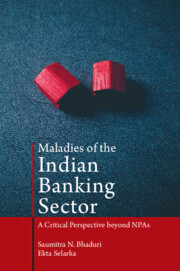Book contents
- Frontmatter
- Dedication
- Contents
- List of Figures
- List of Tables
- Foreword
- Acknowledgements
- 1 Prologue
- 2 The Indian Banking Sector: A Brief History
- 3 The Index of Credit Allocative Efficiency
- 4 Macroeconomic Analyses of Bank Credit Misallocation in the Indian Corporate Sector: Investigation of Pro-cyclicality
- 5 Determinants of Bank Credit Misallocation: Firm-level Analysis
- 6 Allocative Efficiency of Bank Credit and Firm Performance
- 7 Credit Reallocation by Indian Banks in the Aftermath of the Global Financial Crisis
- 8 The Zombie Story: Credit Boom and the Rise of Zombie Firms in the Indian Economy
- 9 Epilogue
- Bibliography
- Index
3 - The Index of Credit Allocative Efficiency
Published online by Cambridge University Press: 27 September 2022
- Frontmatter
- Dedication
- Contents
- List of Figures
- List of Tables
- Foreword
- Acknowledgements
- 1 Prologue
- 2 The Indian Banking Sector: A Brief History
- 3 The Index of Credit Allocative Efficiency
- 4 Macroeconomic Analyses of Bank Credit Misallocation in the Indian Corporate Sector: Investigation of Pro-cyclicality
- 5 Determinants of Bank Credit Misallocation: Firm-level Analysis
- 6 Allocative Efficiency of Bank Credit and Firm Performance
- 7 Credit Reallocation by Indian Banks in the Aftermath of the Global Financial Crisis
- 8 The Zombie Story: Credit Boom and the Rise of Zombie Firms in the Indian Economy
- 9 Epilogue
- Bibliography
- Index
Summary
In an efficient financial market, capital is expected to flow increasingly towards the profitable sectors and thereby generate more returns, ensuring overall growth of the economy (Rajan and Zingales, 1998, 2001). Liberalization of the economy is one step in the direction of increasing efficiency as it opens up the financial markets and boosts the participation of various market participants. A wave of liberalization of capital markets swept across various developing countries in the mid-1980s that replaced a flawed system characterized by government controls and provided the market forces an impetus in determining the interest rates and allocating credit efficiently (Bhaduri and Bhattacharya, 2018). As the markets steadily moved towards a free-market mechanism, the consequences of this process gained significant attention in the financial literature.
Two significant facets of financial liberalization and subsequent development have gained prominence in the empirical literature. One strand of literature focuses on the ‘quantity effect’, which examines the changes in the levels of savings and investment (McKinnon, 1974; Shaw, 1974 Beck, Levine, and Loayza 2000; Rajan and Zingales, 1998, 2001; Ueda, 2006). However, the empirical evidence favouring the quantity impact has been mixed (Devereux and Smith, 1994; Jayaratne and Strahan, 1996; Bandiera, 2000; Bhaduri and Kumar, 2014). In contrast, the second and the more recent literature examines the ‘quality effect’, which analyses whether the financial reforms led to improved allocation of savings and investment. It is often argued that if liberalization has to impact growth positively, it is more likely to be associated with the allocative efficiency of resources across firms and sectors (Bhaduri and Bhattacharya, 2018). While several studies have examined this aspect of reforms, the empirical findings remain contentious (Jaramillo, Schiantarelli, and Weiss, 1992; Wurgler, 2000; Galindo, Schiantarelli, and Weiss, 2007; Abaid, Oomes, and Ueda, 2008). Since the growth of industries through investment depends on the country's structure, country-specific studies can advance understanding of the efficiency of resources and their determinants (Carlin and Mayer, 2003). A few country-specific studies using the data of the 1980s and early 1990s suggest that financial liberalization has been associated with a substantial improvement in efficiency (Cho, 1988, Jaramillo, Schiantarelli, and Weiss, 1992; Harris, Schiantarelli, and Siregar, 1994; Galindo et al., 2002; Abaid, Oomes, and Ueda, 2008).
- Type
- Chapter
- Information
- Maladies of the Indian Banking SectorA Critical Perspective beyond NPAs, pp. 42 - 69Publisher: Cambridge University PressPrint publication year: 2022



